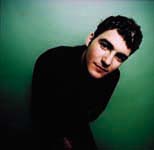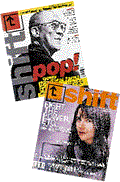
In ancient societies the storyteller was the keeper of all that is sacred. Narrating today's secular scriptures of TV, radio, print and the Internet, Evan Solomon sees himself as a modern-day storyteller.
"I come from a people of story," says Solomon, referring to his Jewish heritage, "and that's all I'm interested in." As a student, he combined majors in English literature and religious studies to learn how the tales in sacred texts influenced the followers of a particular faith. In his career, he has always sought out roles that allow him to weave narratives -- as editor-in-chief of Shift magazine, host of CBC televison's "FutureWorld" and "Hot Type," playwright and overseas reporter, to name a few.
 And he has excelled in each role, moving from one to another out of curiosity, a willingness to take risks and love for his craft. All of his experiences to date have prepared him to tell his most important tale yet -- Solomon's first novel will be released next month. Describing the path to his most desired role as author, he says, "I did not grow up wanting to be Walter Winchell -- more Ernest Hemingway. But it seemed to me that all great writers took a crack at journalism." And he has excelled in each role, moving from one to another out of curiosity, a willingness to take risks and love for his craft. All of his experiences to date have prepared him to tell his most important tale yet -- Solomon's first novel will be released next month. Describing the path to his most desired role as author, he says, "I did not grow up wanting to be Walter Winchell -- more Ernest Hemingway. But it seemed to me that all great writers took a crack at journalism."
Solomon entered the Canadian journalism scene in 1992 with Shift magazine, which he co-founded with friend and current publisher Andrew Heintzman, BA'89, MA'92. Both Toronto natives, they met at McGill where they played squash and Ultimate Frisbee together and bonded over their mutual love of short fiction. With Shift, they aimed to be the literary voice of the twenty-something post-boomers, a demographic largely ignored by magazine publishers. Early issues featured interviews with hot authors Daniel Richler, Douglas Coupland, who wrote the best-selling novel (and coined the phrase) Generation X, and Michael Ondaatje, along with reviews and works of fiction. The magazine's launch was a major media event and the press immediately elected Solomon a "Gen-X pundit du jour" as Toronto Life magazine described him.
The decision to publish a magazine was spur-of-the-moment, says 31-year-old Heintzman, and the early days of Shift were humble ones. With $800 in start-up money, the ambitious duo set up shop in the basement of the Heintzmans' Toronto home. Along with a few part-time volunteers -- including fellow alumni Mark Hyland, BA'89, Andrea Curtis, BA'93, Steve Angel, BA'90, and current senior editor Nadine Csathy, BA'92 -- they began work on their short fiction magazine. "Basically it was just a filing cabinet and a computer," says Heintzman, "and the subscriptions and all the mail came to my parents' home."
 Over the next couple of years, the fiction component of the quarterly decreased. Not only did the pair realize that the opportunities in the marketplace would be greater if they were more than a literary magazine, but their own personal interests had expanded since university. Writing fiction was a phase, "a way of curing our 'academentia,'" explains Solomon. Over the next couple of years, the fiction component of the quarterly decreased. Not only did the pair realize that the opportunities in the marketplace would be greater if they were more than a literary magazine, but their own personal interests had expanded since university. Writing fiction was a phase, "a way of curing our 'academentia,'" explains Solomon.
Gradually Shift began publishing more articles about contemporary culture -- social issues, the media, entertainment, technology and the Internet. And with the metamorphosis of their editorial content, they grew into their name, connoting the change and movement about which they were writing. At one point they even considered naming the magazine Shapeshifter.
After Shift's second issue, a restless Solomon left to work and travel in Southeast Asia and India. Taking a year off from a fledgling magazine may have been risky, but a journey was important to him at that point in his life. "I had been in school for a few years and I wanted to test that knowledge. I was young and I wanted to see and try everything," says Solomon. "I wanted to be a war correspondent. I wanted to be Hemingway, Fitzgerald, Hunter S. Thompson and Tom Wolfe."
So he went to Hong Kong, and a job in the shipping business which he secured through a cousin's cousin's cousin. Almost immediately, he made contact with the South China Morning Post and began freelancing as a journalist for them. For someone with no prior newspaper experience, requests to write about unfamiliar subjects in a foreign land without a network of contacts might have been overwhelming. But if the assignment editor asked whether Solomon knew anything about Hong Kong pension plans, the diamond trade with Amsterdam or South Korean trade missions, he always replied that he did.
 "Of course I knew nothing about these topics," laughs Solomon. "I was an expat from Canada and had been in Hong Kong for three weeks." The absurd became the ridiculous when he was asked if he could accompany a stud horse to Calcutta and inject it with a tranquilizer for the flight. His answer? Absolutely! "Of course I knew nothing about these topics," laughs Solomon. "I was an expat from Canada and had been in Hong Kong for three weeks." The absurd became the ridiculous when he was asked if he could accompany a stud horse to Calcutta and inject it with a tranquilizer for the flight. His answer? Absolutely!
After a year, keeping his promise to Heintzman, Solomon returned home to Toronto and to Shift. The editorial product had developed since its inception, but the magazine's revenues were lagging. After receiving help with their business plan, the pair cranked up the circulation, sold more advertising and increased the magazine's frequency to every other month. What they needed next was an investor, so for about six months they scheduled meeting after meeting to promote their magazine. When Maclean Hunter bought ten per cent of Shift in 1996, followed a year later by the outright purchase by Behaviour Publishing, a Montreal-based software company, they were able to run the magazine on a solid financial footing.
From modest beginnings, Shift has earned itself a respected place in Canadian publishing. Now headquartered in an Art Deco downtown Toronto office building and boasting a circulation of 70,000, the magazine will increase its frequency from nine to ten issues this year, and there are plans to launch it in the U.S. in September.
With a talented staff of young designers and writers, Shift prides itself on being plugged into what's out there. Its October 1998 cover story, for example, featured web-porn entrepreneur Danni Ashe, whose story aired months later on American television's "Entertainment Tonight." At last year's National Magazine Awards, Shift received industry recognition with 13 nominations, winning two golds and two silvers. Close to centre stage, the Shift table was the rowdiest in the room as they boisterously cheered their victories. Celebrations continued into the night at a post-awards party hosted by the Shift gang at a funky downtown bar.
 Evan Solomon and Andrew Heintzman, co-founders of Shift, in their Toronto office, June 1997. |
While trying to get Shift off the ground with few financial resources, one of Solomon's survival strategies had been to find supplemental employment. So when CBC Newsworld needed a host in 1994 for its new show, "FutureWorld," he interviewed for the position. Coming from Shift, Solomon was the perfect candidate to discuss the social implications of change, from technology to arts to medicine to agriculture. Some previous on-air experiences on radio (CBC's "Morningside" and "The Arts Tonight") helped him, as did an early local cable talk show Heintzman and Solomon had produced, with Solomon as host. Their program lasted six episodes. "It was relatively entertaining," says Heintzman. "But it was definitely cable television!"
There was initial concern that Solomon's face was just too fresh and boyish, but he clearly outperformed the competition and landed the CBC job. Andrew Johnson, producer of "FutureWorld" and "Hot Type," says now, "It was the best decision we ever made." Recognizing the talent it had scored, the "FutureWorld" production crew began to build the show around Solomon, incorporating more of his personality into the interviews. "We had some fiery debates," recalls Johnson. "When people do the media treadmill, they tend to get the same questions and the same bland approach." Of Solomon's interviewing style, described by critics as engaging, controversial and charismatic, Johnson observes: "Many times I found that our guests were excited and charged up, even if Solomon was challenging them."
Solomon hosted the half-hour "FutureWorld" for four seasons. Juggling a magazine, a TV show, a novel and a social life made for a hectic existence. "I didn't sleep for about five years. When people say they wish they'd worked harder in their 20s, I wish I'd worked less. But I was loving it," he laughs. The bonus was that Shift and "FutureWorld" were similar in subject matter so what he was learning at the magazine enhanced his ability to perform on the show.
In 1998 "FutureWorld" won a Gemini award for Best Lifestyle Information Series, and Solomon was nominated three times for best host. He offers a modest explanation for his on-air naturalness. "While some people begin a show with a lot of hype, 'FutureWorld' started without much promotion. I had a lot of time to get comfortable. Five years ago when I went on TV the only people who knew were my family and the nine people who worked at Shift." But the show soon had a following. On a business trip to Montreal, Johnson recalls, several people in Schwartz's deli recognized Solomon and approached him about the show.
After "FutureWorld" ended in 1998, Solomon became host later that year of "Hot Type" -- a show about key players and ideas in print culture. While Solomon quotes from the works of renowned authors often and with ease, he will not, however, name-drop the high profile individuals he's interviewed -- and there are many. The archives on the two shows' web sites reveal discussions with Stephen King, architect Moshe Safdie, filmmaker Atom Egoyan, the Body Shop's Anita Roddick, writer-historian Michael Ignatieff, trend analyst Faith Popcorn and authors Elmore Leonard and Doris Lessing. And for Shift, he also spoke with the Dalai Lama.
 Conversing with a variety of accomplished people on diverse topics is but one example of Solomon's intellectual range. While curiosity and research are important, he credits his university education with enabling him to discuss an eclectic mix of issues. "University to me was this great deal. You get to ask any question you ever wanted an answer to, and someone has to answer," Solomon says. "And I came to McGill with a thousand questions." Conversing with a variety of accomplished people on diverse topics is but one example of Solomon's intellectual range. While curiosity and research are important, he credits his university education with enabling him to discuss an eclectic mix of issues. "University to me was this great deal. You get to ask any question you ever wanted an answer to, and someone has to answer," Solomon says. "And I came to McGill with a thousand questions."
So he read voraciously in the arts for his cross-disciplinary undergraduate and master's programs and made use of the unlimited resources surrounding him. "Just as Spike Lee said he used NYU as a cheap way to get film equipment, for me university was a cheap way to get brain equipment." And his master's thesis on myth and ritual in popular culture provided a theoretical background to his instinctive feel for the art of storytelling. "I was interested in how myth and ritual play out, not just in a wider society, but personally," says Solomon. "What do stories do to make us who we are, and how does the active imagination shape society?"
While his name remains on Shift's masthead as executive editor (a consulting position), Solomon left the magazine to pursue full-time his greatest passion -- fiction writing. "I've sort of geared my whole life to this. Where I used to thrive on excess, I'm now focusing on writing." His first book, Crossing the Distance, a dark, satirical story about the friendship between two brothers and the media's role in covering the incident that comes between them, will be published in April. The idea came to him years ago while travelling by bus from Kathmandu, Nepal, to Darjeeling, India, although it wasn't until 1997 that he seriously began writing it.
"I don't get intimidated on television or writing for a magazine, but the whole process of writing fiction was much more terrifying," admits Solomon. "I've been so proprietary about the book because fiction is such a personal idea."
Despite all the time dedicated to his work, he is also known for being a cheeky character around town. The 6'3" Solomon once posed in nothing more than a designer sweater in a pictorial for The Globe and Mail's bimonthly Fashion & Design section. He speaks enthusiastically about playing guitar and hockey, and in the summer months he is often spotted roller blading through Toronto's Annex neighbourhood. His life has been so jam-packed with adventures that it is only in passing that he mentions trips to Europe and the Arctic before university, being active in rowing and theatre at McGill, his current renovation of a recently purchased house and work on a future screenplay.
If he has an oversize talent, is there an ego to match? Colleagues say he has a healthy degree of confidence, but is certainly no prima donna. "Some people are one thing on camera and another thing off," says Johnson, "but Solomon's pretty much the way he appears to be on TV and he's comfortable with who he is. He has a curiosity and a kind of enthusiasm that's infectious and he's always looking to be challenged."
In 1997 Maclean's named him one of the "100 Canadians to Watch," but keeping an eye on Evan Solomon -- who moves so fast and shifts so often -- may not be that easy.
Danyael Halprin works at Canadian Living magazine and is also a freelance writer in Toronto.
|